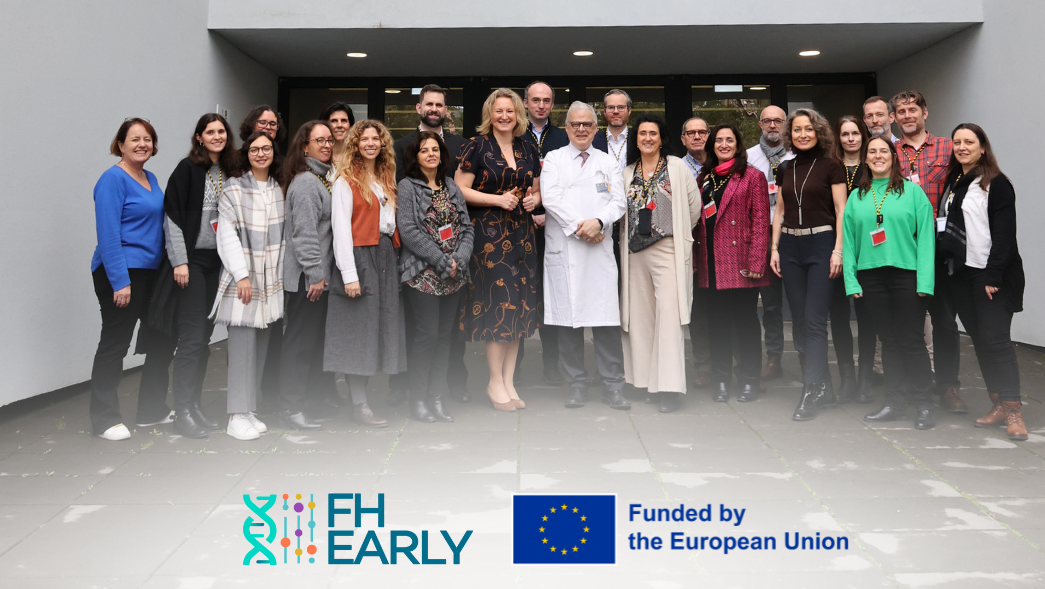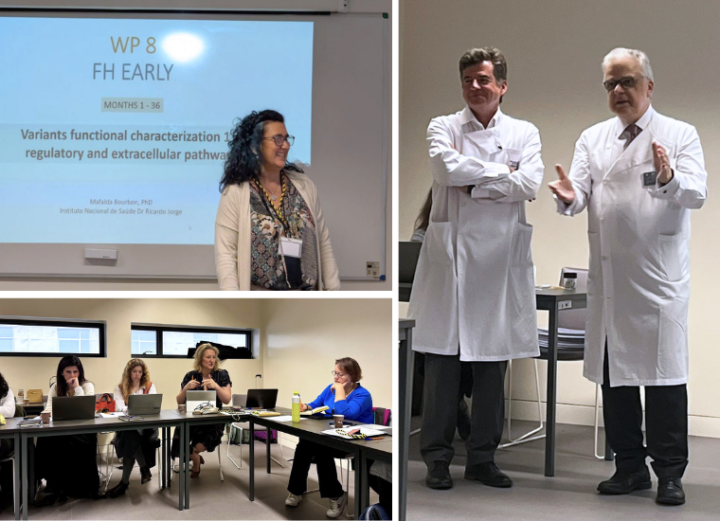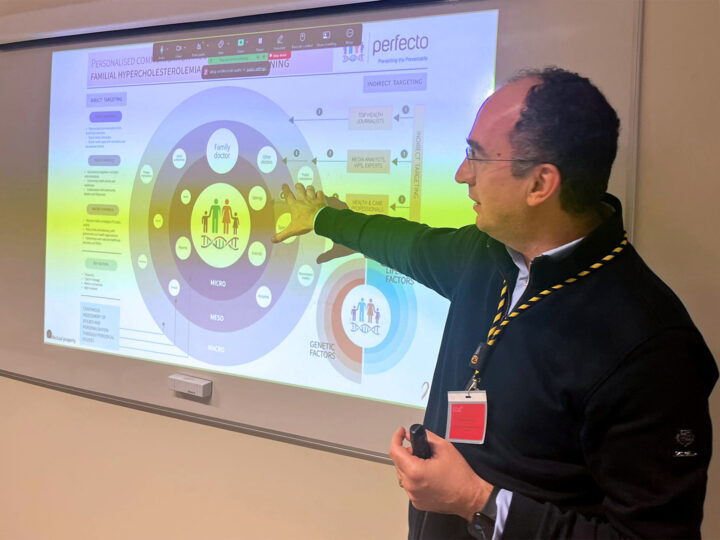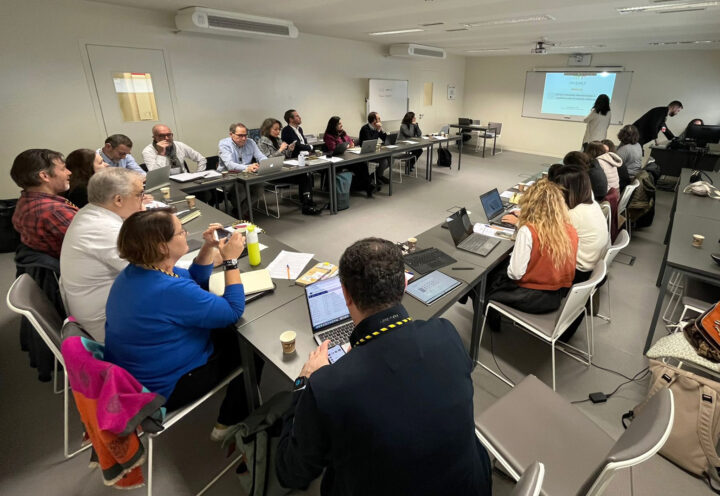
Lisbon, Portugal – January 24, 2025. The groundbreaking research project, “New Strategies for The Early Diagnosis, Risk Stratification, and Co-Management of Familial Hypercholesterolemia (FH-EARLY)”, officially launched on January 1, 2025, ushering in a new era of precision medicine and patient-centred care for familial hypercholesterolemia (FH). Running until December 31, 2028, FH-EARLY is supported under the HORIZON Research and Innovation Actions framework with a highly competitive grant of €7.25 million.
The project was inaugurated during an enthusiastic kick-off meeting in Lisbon on January 23, 2025, where representatives from 15 leading institutions across Europe, Lebanon, and Turkey united to align their vision of addressing the urgent needs of FH patients through groundbreaking innovation. This collaboration heralds a new era in tackling the underdiagnosis and undermanagement of familial hypercholesterolemia (FH), the most common inherited condition affecting LDL cholesterol metabolism.
FH-EARLY is led by Associação para Investigação e Desenvolvimento da Faculdade de Medicina (AIDFM) in Portugal and powered by a consortium of 15 distinguished partners, bringing together world-class expertise in genomics, bioinformatics, explainable AI, clinical care, and patient advocacy, ensuring FH-EARLY delivers practical and impactful solutions.

FH-EARLY aims to address some of the persistent challenges of FH, listed by the World Health Organisation (WHO) over a quarter of a century ago. FH, named in the WHO report from 1997 a global public health issue, affects over 30 million individuals worldwide, including 2.5 million Europeans, yet less than 10% of cases are diagnosed, leaving millions at high risk of preventable cardiovascular disease (CVD). Many individuals remain unaware of their condition until they experience a serious cardiovascular event, like a heart attack, or premature heart health issues or even death(s) in the family, highlighting the critical need for earlier and more precise detection.
Current FH care is further hindered by gaps in treatment adherence as well as access, psychosocial barriers, and a lack of culturally tailored communication strategies with the citizen/patient and the health community around FH, cholesterol, genetics and related topics. FH-EARLY seeks to close these gaps by developing solutions that focus not only on cutting-edge technology but also on the human experience, ensuring that patient voices shape every stage of development. To achieve that the project will leverage findings and solutions from sister projects like PERFECTO FH and PerMed FH.


FH-EARLY places patients and families with FH at the heart of innovation. The project’s strength lies in its patient-centric and co-creation approach, involving individuals with FH, including younger people aged 16-24, and their caregivers in designing, testing, and validating solutions. This ensures the tools are practical, culturally relevant, and tailored to the diverse needs of families living with FH, making the project unique and first of its kind.
The groundbreaking innovations at the core of FH-EARLY integrate state-of-the-art technology, precision medicine, and social science research to deliver transformative solutions. The Next-Generation Chip Array will be a highly accessible diagnostic platform offering faster, more affordable genetic testing that identifies genetic causes of FH. A Signature Biomarker intends to offer breakthrough innovation for unparalleled risk stratification and individualised care plans. And finally, the cutting-edge tool - Explainable AI-Driven Integrative Precision Health Profiling (iPHP) Tool, which combines predictive modelling and multi-modal data to guide patients and care providers in managing FH. Its focus on transparency and trust makes AI insights actionable and comprehensible, empowering shared decision-making.
These innovations aim to save lives, prevent heart attacks, and safeguard the cardiovascular health of future generations. The use of explainable AI ensures that both patients and clinicians can trust and understand the recommendations, building confidence in technology while supporting informed care choices.
FH-EARLY is unique in its integration of basic and clinical research with social and behavioural sciences, which are often overlooked in healthcare. The project addresses persistent barriers in health literacy, emotional resilience, and communication to ensure solutions meet the needs of patients in real-world contexts. With a focus on culturally sensitive localisation, FH-EARLY’s efforts aim to build trust and break down barriers in underserved populations, enabling equitable access to life-saving care.
The impact of FH-EARLY extends far beyond medical care. Cardiovascular disease costs the EU an estimated €282 billion annually, encompassing healthcare costs and productivity losses. By enabling earlier diagnosis and more precise interventions, FH-EARLY has the potential to significantly reduce this economic burden, while empowering individuals to lead healthier, heart-attack-free lives. The project comes at an important time in Europe, where the urgency to address the burden of CVD is recognised with a commitment to establish a Cardiovascular Health Plan. By uniting cutting-edge research and technology, patient-centred approaches, and collaborative innovation, the project provides hope for millions living with FH to never become CVD patients.
"With FH-EARLY we continue our mission to prevent the preventable. As CEO of FH Europe Foundation, I am immensely proud and deeply hopeful about the FH-EARLY project. This groundbreaking initiative brings together all the essential elements of precision medicine to address the persistent challenges faced by the FH community. It is a powerful step forward in ensuring earlier diagnosis, equitable care, and a brighter, heart-attack-free future for millions of individuals and families affected by FH." - Magdalena Daccord
FH-EARLY is funded by the European Union through the European Health and Digital Executive Agency (HaDEA) as part of the HORIZON-HLTH-2024-DISEASE-03-two-stage call. Views and opinions expressed are those of the author(s) only and do not necessarily reflect those of the European Union or HaDEA. Neither the European Union nor HaDEA can be held responsible for them.
Stay updated via our official channels (launching soon) and follow the conversation
#FHEARLY
For FH-EARLY Consortium inquiries, please contact:
Mr André Chagas
Senior Project Manager
Cardiovascular Centre of the University of Lisbon / AIDFM
andre.chagas@medicina.ulisboa.pt
For FH-EARLY at FH Europe Foundation, please contact:
Ms Magdalena Daccord
CEO
FH Europe Foundation
md@fheurope.org
FH-EARLY is a Horizon Europe-funded initiative dedicated to transforming care for familial hypercholesterolemia through groundbreaking innovations in early diagnosis, risk stratification, and co-management. By leveraging the latest technology, social science, and patient-centered design, FH-EARLY aims to improve outcomes for millions of individuals worldwide.